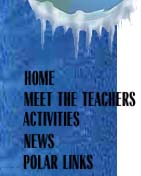
|
Annual Report for Andre Wille
Were you in the field this season?
Yes
Dates in the Field:
Dec 27, 1999- Feb 2, 2000
Countries Represented:
USA, New Zealand
Additional Comments:
I conversed with a number of pre service teachers enrolled in a science
methods course regarding ways I utilized the TEA experience in the
classroom.
Did you maintain a daily (or as often as possible) electronic journal while in the field?
Yes
Continued Collaboration with Reasearch Team Members
Date:
summer, fall and winter of 2000
Type of Interaction: e mail, postal service mail I sent my PI a copy of the activity I
developed during the summer activities workshop. He answerred a few
questions I had, and sent a copy of a great kids book that an artist in
residence wrote and illustrated during an earlier field season. I will be
able to use the book during some of my presentations.
How are you sharing your research experience with students?
In my own classroom I have used my slide shows in each of my classes the
past two school years. I ahve used a variety of lesson plans and
activities in the classses I teach, depending on the content area. In all
of my classes I have tried to relate content material to current antarctic
research projects which I am familiar with. This has involved short
anecdotes from my experience, explanation of links between what we are
doing in class and what is happpening at the poles, as well as specific
lessons related to polar research.
In my Physical Science classes for grade 10, students have done an
internet
research project related to an antarctic topic of their choice. Studnets
then compiled a fact sheet of brochure on the topic and presented it to
the class. We have also done a lab related to ocean salinity and freezing
point depression.
In biology classses, we have looked closely at the food web of the
antarctic waters and used the slide show to see the actual animals and
their roles in the local ecology. We have also spent a great deal of time
sampling local environments for tardigrades. These tiny organisms are one
of the the few terrestrial animals found in the Antsaarctic. They exhibit
the interesting property of anhydrobiosis, which ahas been a usefull topic
of discussion in class.
I have developed an activity related to my field experience which involves
plotting radio telemetry data on a sattellite image of McMurdo sound.. I
am
fine tuning this an plan to use it in my biology classes this winter.. It
is posted on the activity web site. I have given it to other teachers to
use.
In chemistry we have researched and discussed the atmospheric chemistry of
the ozone hole. I have put together a computer presentation on the topic
to
I have developed an activity related to my field experience which involves
plotting radio telemetry data on a sattellite image of McMurdo sound.. I
am
fine tuning this an plan to use it in my biology classes this winter.. It
is posted on the activity web site. I have given it to other teachers to
use.
In chemistry we have researched and discussed the atmospheric chemistry of
the ozone hole. I have put together a computer presentation on the topic
toaid my presentatons. One of my chemistry students wrote her research paper
on water quality testing using comparisons of data taken form the LTER in
the McMurdo dry valleys. She compared her data with that of the LTER for
the following parameters: pH, alkalinity, Temp. hardness, DO . This
was
a great way to involve students in the research being done at the poles
while involving them in their own actual research.
Mentoring/Collaborative Mentoring Team
Name:
Diana Kruiz
Active?
Yes
Active?
Yes
Active?
No
Contact Hours:
81.5
Number of Associates in local network:
2
Date:
several conversations and meeting Fall 2000
Location:
Basalt Co.
Type of Interaction: Phone conversations, meetings and sharing of lesson plans and videos. I plan to present to his classroom if possible. Ongoing
Presentations and Real Audio Sessions
Have you presented to your local poard of education? (first year)
N/A
Title:
Penguin Prefenences
Description:
Title:
Internet scavenger hunt.
Description:
Title:
Monitoring Ultraviolet Radiation with photo sensative paper.
Description:
Have these activities been submitted to the Web for posting?
Yes
Activity: Nov. 2000 Southwest region ECW Gear Monitoring
Oct. 2000 colorado Science Convention TEA presentation
Activity:
Activity:
Have you submitted all press-related materials concerning your TEA experience to the TEA Archives?
Yes
Have you submitted 20 slides to the TEA Archive? (first year)
Yes
Have you submitted 6-8 photos to the TEA Arichive? (first year)
Yes
Dates:
3/20/00, 4/10/00 1/2 day
Reasons for Release:
Basalt MS and Elementatry Presentation
Approximate Daily Rate of Substitute:
$100
TEA Meetings Covered by School/District
Names of Meetings:
colorado Science Convention
Dates:
10/21/00
Approximate Cost of Travel Expenses:
$120
Equipment Provided by Institution/Corporation/District
Type of Equipment:
iMAC special edition Computer to facilitate electronic communication while in the field.
Date of Purchase:
Nov. 1999
Approximate Cost of Equipment:
$2000 W/ CU see me software and camera
Type of Grant / Grant Title:
Antarctica Trunk
Purpose of Grant:
To fund release time for presentations out of district and to purchase classroom set of
Granting Institution/Corporation/District:
Aspen Thrift Shop
Date of Application:
1/8/01
Date of Notification:
1/19/2001
Grant Total:
$2000
Other Shared Costs
Hope to continue presentations in local schools. I have several lined up for Jan- Mar.
I am mentoring a new person, this is going well.
Hope to sign up some TEA Associates. I have two that are very interested but havent done the application.
|
